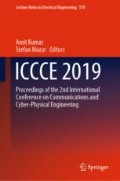Abstract
Model transformation is a key factor in the software project management. Model and its transformation is a key factor of software project process. This can be adapted by using some new transformation language. This paper aims to convert a class diagram (CLD) to Relational Schema (RS). Which include different perspective like, blocks, fitness function, and algorithm. Model transformation contribute major role in Model Driven Engineering (MDE). So transformation is perspective for the agile software development methodology. Transformation is part of agile methodology, which makes a better result for whole transformation process. For the same different algorithm are requiring for calculating the concern value for fitness function. This research work refer a optimization algorithm for phase 1 and phase 2 module and try to get a better output as compare to other algorithm like DA, PSO, ADF. This work will consider the Ant Colony optimization (ACO) algorithm integrated with dragonfly algorithm (ACADF) for the model transformation. These model transformations also consider the fitness function accordingly. Further it evaluate and analyzed using Automatic correctness (AC) and related fitness function, which pave the blocks for better result.
Access this chapter
Tax calculation will be finalised at checkout
Purchases are for personal use only
References
Sendall S, Kozaczynski W (2003) Model transformation: the heart and soul of model-driven software development. IEEE Softw 20(5), 42–45
Rahim LA, Whittle J (2015) A survey of approaches for verifying model transformations. Softw Model 14(2), 1003–1028
Ehrig H, Ehrig K, Taentzer G (2006) Fundamentals of algebraic graph transformation. Monographs in Computer Science
OMG (2018) OCL 2.4 specification. http://www.omg.org/spec/OCL/2.4/
Cuadrado JS, Esther G, Lara J (2017) Static analysis of model transformations. IEEE Trans on Softw Eng 43(9):868–897
Jouault F, Allilaire F, Bézivin J, Kurtev I (2008) ATL: a model transformation tool. Sci Comput Program 72(1):31–39
Czarnecki K, Helsen S (2006) Feature-based survey of model transformation approaches. IBM Syst J 45(3):621–645
Schmidt D (2006) Model-driven engineering. IEEE Comput 39(2):25–31
Fleck M, Troya J, Kessentini M, Wimmer M, Alkhazi B (2017) Model transformation modularization as a many-objective optimization problem. IEEE Trans Softw Eng, 43(11), 1009–1032
Gammaitoni L, Kelsen P, Ma Q (2018) Agile validation of model transformations using compound F-Alloy specifications. Sci Comput Program 162:55–75
Liu X, Yu Y, Zhen L, Herbert H. C. Iu, Tyrone F (2017) An efficient algorithm for optimally reshaping the TP model transformation. IEEE Trans Circ Syst II 64(10):1187–1191
Cuadrado JS, Guerra E, Lara J (2014) A component model for model transformations. IEEE Trans Softw Eng 40(11):1042–1060
Kessentini M, Sahraoui H, Boukadoum M, Ben O (2012) Search-based model transformation by example. Softw Syst Model 11(2):209–226
Blum C (2005) Ant colony optimization: introduction and recent trends. Phys Life Rev 2(4):353–373
Kessentini M, Boukadoum H, Omar O (2012) Search-based model transformation by example. S/w & Syst Model 11(2), 209–226
Jadhav PP, joshi S, Fractional weightage based objective function to hybrid optimization algorithm for Model Transformation, Evolutionary intelligence. Springer; ISSN-1864-5909
Ko JW, Beak S, Song Y (2012) Model optimization with graph transformation and PSO algorithm for model transformation verification. In: Proceedings of international conference on IT convergence and security, vol 120, 2012
Author information
Authors and Affiliations
Corresponding author
Editor information
Editors and Affiliations
Rights and permissions
Copyright information
© 2020 Springer Nature Singapore Pte Ltd.
About this paper
Cite this paper
Jadhav, P.P., Joshi, S.D. (2020). ACADF: Ant Colony Unified with Adaptive Dragonfly Algorithm Enabled with Fitness Function for Model Transformation. In: Kumar, A., Mozar, S. (eds) ICCCE 2019. Lecture Notes in Electrical Engineering, vol 570. Springer, Singapore. https://doi.org/10.1007/978-981-13-8715-9_13
Download citation
DOI: https://doi.org/10.1007/978-981-13-8715-9_13
Published:
Publisher Name: Springer, Singapore
Print ISBN: 978-981-13-8714-2
Online ISBN: 978-981-13-8715-9
eBook Packages: EngineeringEngineering (R0)

